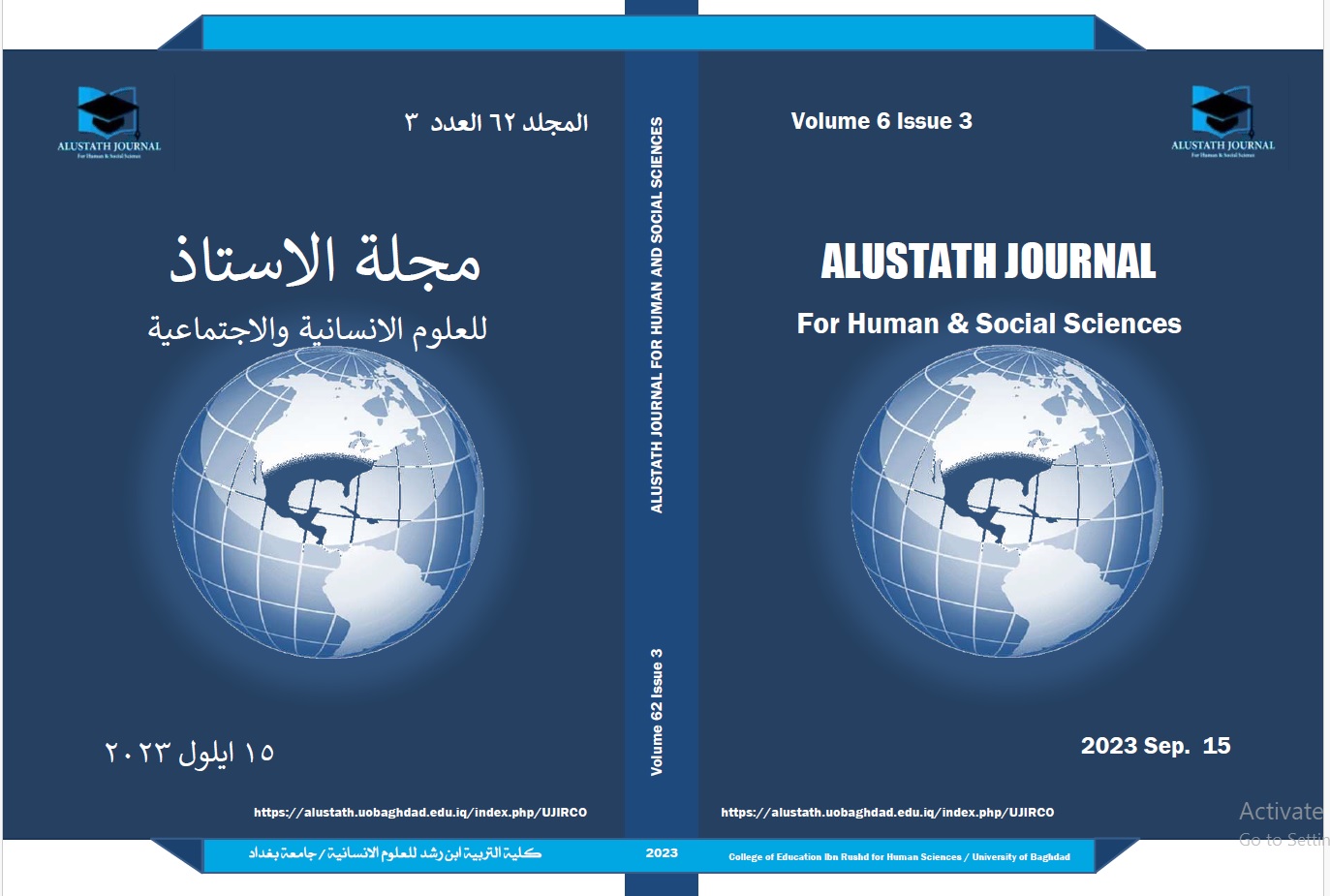درجة استخدام معلمات المرحلة الثانوية لتكنولوجيا الواقع المعزز في التعليم من وجهة نظرهن واتجاهاتهن نحوها وعلاقتها ببعض المتغيرات
DOI:
https://doi.org/10.36473/ujhss.v62i3.2210الكلمات المفتاحية:
تكنولوجيا الواقع المعزز، العملية التعليمية، المعلمات، الاتجاهات، مدينة أبهاالملخص
تحاول الدِّراسة بمقتضى عنوانها التعرف على درجة استخدام معلمات المرحلة الثانوية بمدينة أبها لتكنولوجيا الواقع المعزز في التعليم من وجهة نظرهن واتجاهاتهن نحوها وعلاقتها ببعض المتغيرات، وقد اعتمدت المنهج الوصفي التحليلي عمدة في كشف نتائج الدِّراسة التي شملت (398) معلمة للمرحلة الثانوية بمدينة أبها، وهي العينة التي تم اختيارها بطريقة عشوائية، واتخذت من الاستبانة أداة لجمـع البيانات. وباعتماد ما سبق من الأدوات والمنهج انتهت الدِّراسة في نتائجها إلى أن درجة استخدام تكنولوجيا الواقع المعزز في التعليم لدى معلمات المرحلة الثانوية حققت درجة عالية بواقع (3.82) من وجهة نظرهن. كما أوضحت الدِّراسة أن اتجاهات المعلمات نحو استخدام تكنولوجيا الواقع المعزز في التعليم كان إيجابيًا وبدرجة عالية حيث بلغ المتوسط الحسابي (4.32)، كما أوضحت أيضًا بوجد دلالة إحصائية عند مستوى (0.05) لدرجة استخدام تكنولوجيا الواقع المعزز في التعليم لدى معلمات المرحلة الثانوية بالنسبة لمتغيرات (العمر، والدورات التدريبية)، وبالمقابل لم تكن فروق ذات دلالة إحصائية في درجة استخدام تكنولوجيا الواقع المعزز في التعليم لدى معلمات المرحلة الثانوية بالنسبة لمتغيرات (سنوات الخبرة، والتخصص). وبناءً على أهم النتائج أوصت الدِّراسة بضرورة تدريب المعلمات على إنتاج محتوى الواقع المعزز وتصميمه واستخدامه في العملية التعليمية والعمل بشكل علمي محاولةً للتغلب على المعوقات التي تواجههن لاستخدام تكنولوجيا الواقع المعزز في تدريسهن.
التنزيلات
المراجع
Abd al-Ridha, A. H. & Al-Rashidi, B. D. (2022). Attitudes of secondary school teachers in the State of Kuwait towards augmented reality technology and obstacles to its use in education from their point of view. Reading and Knowledge Journal (254), 81, 126-130.
Abdel-Hamid, F. M. (2019). Augmented reality self-regulation skills and achievement among first-year secondary school students. Arab Studies in Education and Psychology, 107 (107), 207-228.
Akçayir M, &Akçayir G (2017). Advantages and challenges associated with augmented reality for education: a systematic review of the literature. Educ Res Rev 20:1–11. https://doi.org/10.1016/j.edurev.2016.11.002
Akçayir M, Akçayir G (2017) Advantages and challenges associated with augmented reality for education: a systematic review of the literature. Educ Res Rev 20:1–11. https://doi.org/10.1016/j.edurev.2016.11.002
Al- Ghoul, R. (2016). Designing learning environments using augmented reality technology for people with special needs. Arab Studies in Education and Psychology (ASEP), 2 (4).
Al-Anzi, M. N. & Hashem, Z. M. (2019). The effectiveness of using augmented reality technology in acquiring scientific concepts among hyperactive children in Qurayyat Governorate, Saudi Arabia. Journal of Research in the Fields of Specific Education, 5 (Issue 22 Technology (Part Three), 32–54.
Al-Ghoul, R. (2016). Designing learning environments using augmented reality technology for people with special needs. Arab Studies in Education and Psychology (ASEP), 2 (4).
Al-Hamed, A. H. (2020). Obstacles to using augmented reality techniques in teaching from the point of view of educational supervisors. Graduate School of Education - Cairo University Journal, 28 (2), 175-133.
Al-Harthy, M. T. & Al-Essa, H. A. S. (2022). The degree of using augmented reality technology and its obstacles in teaching science in the intermediate stage from the point of view of female teachers and supervisors in Makkah Al-Mukarramah. Journal of the College of Education (Assiut), 38(6), 209–248.
Al-Hwaiti, H. R. D., & Al-Balawi, A. M. K. (2019). Attitudes of middle school mathematics teachers towards augmented reality technology and obstacles to its use in teaching mathematics in Tabuk. Arabic Studies in Education and Psychology, 112, 197-238.
Al-Mashaykhiya, B. N. & Mai, M. (2022). The reality of the second field teachers' practice of augmented reality technology in teaching science to develop higher-order thinking skills among first-cycle students in Al-Sharqiyah South Governorate. Journal of Curricula and Teaching Methods, (1) 1, 42–69.
Al-Najdi, S. M. (2022). The Effectiveness of Using Augmented Reality (AR) to Enhance Student Performance: Using Quick Response (QR) COdes in Student Textbooks in the Saudi Education System. Educational Technology Research and Development, 1-20. Retrieved from https://www.ncbi.nlm.nih.gov/pmc/articles/PMC8978775/
Al-Najdi, S. M. (2022). The Effectiveness of Using Augmented Reality (AR) to Enhance Student Performance: Using Quick Response (QR) codes in Student Textbooks in the Saudi Education System. Educational Technology Research and Development, 1-20. https://www.ncbi.nlm.nih.gov/pmc/articles/PMC8978775/
Al-Rahili, L. H. (2021). Attitudes of teachers with learning disabilities towards using augmented reality in teaching in Madinah. Arab Journal of Disability and Giftedness Sciences, (18)5, 223-270.
Al-Sabei, S. & Essa, J. (2020). The Reality of Using Augmented Reality Technology from the Point of View of Primary School Teachers in their Schools. Arab Journal for Scientific Publishing (AJSP), 26 (1).
Al-Sabei, S. & Essa, J. (2020). The Reality of Using Augmented Reality Technology from the Point of View of Primary School Teachers in their Schools. Arab Journal for Scientific Publishing (AJSP), 26 (1).
Al-Shahrani, H. A. (2021). Examining Saudi Secondary School Teachers’ Acceptance of Augmented Reality Technology. Islamic University Journal for Educational and Social Sciences,5(2), 153-179. https://journals.iu.edu.sa/ESS/Main/Article/3432
Al-Shahrani, H. A. (2021). Examining Saudi Secondary School Teachers’ Acceptance of Augmented Reality Technology. Islamic University Journal for Educational and Social Sciences,5(2), 153-179. https://journals.iu.edu.sa/ESS/Main/Article/3432
Al-Shehri, A. S. (2019). The degree of awareness of middle school mathematics teachers of the concept of augmented reality technology and its uses in teaching from their point of view in the city of Tabuk. Journal of Scientific Study in Education, 20, (13), 511529
Al-Thaqafi, N. A. & Al-Shahrani, M. M. (2022). Obstacles to using augmented reality technology in teaching deaf and hard-of-hearing students from the point of view of teachers in Jeddah. Arab Journal of Disability Science and Giftedness, (91), 336-303.
Al-Zahrani, H. A. (2018). The impact of employing augmented reality technology on developing higher-order thinking skills among middle school students. Journal of Educational and Psychological Sciences, 2 (26), 90-70.
Al-Zein, H. A. (2020). Technological Incentives in the Educational Process. Riyadh: King Fahd National Library.
Chen, C. H., Huang, C. Y., & Chou, Y. Y. (2019). Effects of augmented reality-based multidimensional concept maps on students’ learning achievement, motivation, and acceptance. Universal Access in the Information Society, 18, 257-268.
Chiang, T. H., Yang, S. J., & Hwang, G. J. (2014). Students' online interactive patterns in augmented reality-based inquiry activities. Computers & Education, 78, 97-108.
Dunleavy, M., Dede, C., & Mitchell, R. (2009). Affordances and limitations of immersive, participatory augmented reality simulations for teaching and learning. Journal of Science Education and Technology, 18, 7-22.
Garzón, J., Pavón, J., & Baldiris, S. (2017). Augmented reality applications for education: Five directions for future research. Lecture Notes in Computer Science, 402–414. https://doi.org/10.1007/978-3-319-60922-5_31
Huang, T.-C., Chen, M.-Y., & Hsu, W.-P. (2019). Do Learning Styles Matter? Motivating Learners in an Augmented Geopark. Educational Technology & Society, 22 (1), 70–81.
Ibáñez, M.-B., & Delgado-Kloos, C. (2018). Augmented reality for STEM learning: A systematic review. Computers & Education, 123, 109–123. https://doi.org/10.1016/j.compedu.2018.05.002
Kurubacak, G., & Altinpulluk, H. (2017). Mobile technologies and augmented reality in open education. IGI Global. https://doi.org/10.4018/978-1-5225-2110-5
Lafargue, D. (2018). The Influence of Mixed Reality Learning Environments in Higher Education STEM Programs: A Study of Student Perceptions of Mixed Reality Self-Efficacy, Engagement, and Motivation Using Augmented and Virtual Reality. University of Louisiana at Lafayette.
Lee, K. (2012). Augmented reality in education and training. TechTrends 56(2):13–21. https://doi.org/10.1007/s11528-012-0559-3
López-Belmonte, J., Moreno-Guerrero, A.-J., López-Núñez, J.-A., & Hinojo-Lucena, F.-J. (2020). Augmented reality in education. A scientific mapping in web of science. Interactive Learning Environments, 1–15. https://doi. org/10.1080/10494820.2020.1859546
Martin. 2019. Benefits of Augmented Reality. (AR) Online: https://smartglasseshub.com.
Sahu, C. K., Young, C., & Rai, R. (2021). Artificial intelligence (AI) in augmented reality (AR)-assisted manufacturing applications: a review. International Journal of Production Research, 59(16), 4903-4959.
Shea, A. M. (2014). Student perceptions of a mobile augmented reality game and willingness to communicate in Japanese (Doctoral dissertation, Pepperdine University).
Trupiano, J. (2020). Learning theories and augmented reality. LinkedIn. Retrieved March 5, 2023, from https://www.linkedin.com/pulse/learning-theories-augmented-reality-john-trupiano/
Turan, Z., Meral, E., & Sahin, I. F. (2018). The impact of mobile augmented reality in geography education: achievements, cognitive loads, and views of university students. Journal of Geography in Higher Education, 42(3), 427-441.
Tzima, S., Styliaras, G., & Bassounas, A. (2019). Augmented reality applications in education: Teacher’s point of view. Education Sciences, 9(2), 99. https://doi.org/10.3390/educsci9020099












